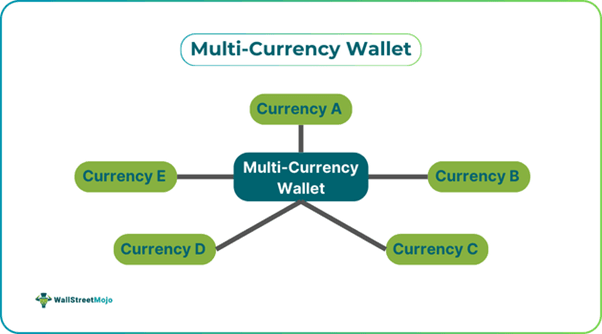Table of Contents
What Is A Multi-Currency Wallet?
Multi-currency wallet is a digital facility that allows the individual or business to hold, send, and receive various foreign and local currencies in one place. As a result, businesses and individuals do not have to open different accounts for different currencies. Ultimately, the best multi-currency wallet shall save users from excessive conversion fees and unnecessary transactional delays.

These wallets are particularly useful if a business transacts with clients, partners, and customers in multiple countries or for any individual or business that transacts regularly in multiple currencies. Therefore, the exchange fees are lower, and the convenience of paying from one account is high for the users of these wallets.
Key Takeaways
- Multi-currency wallets are digital vaults that hold multiple currencies in one place and allow the customer to send and receive them without opening a different account for each currency.
- Extensive security methods and blockchain technology protect users' information and funds.
- It allows users to send and receive money in different currencies from one dashboard, preventing them from spending hundreds, if not thousands, in conversion and platform fees.
- Transactions from and to multiple countries may be stressful already from a business context.
- These wallets make it simpler for these customers by integrating all payments from a singular platform or application.
How Does Multi-Currency Wallet Work?
A multi-currency wallet is a digital feature that allows its users to manage, store, send, and receive funds in multiple local and international currencies and sometimes even cryptocurrencies from the same wallet.
For individuals and businesses with regular transactions in different countries in various currencies, an efficient multi-currency wallet app may be the best thing as they do not have to open a different account for every currency they transact in, and the need for understanding different financial platforms also gets eliminated.
Using the same platform for all currencies and international transactions allows individuals or businesses to reduce the exchange rate and conversion fees significantly. Moreover, the transfer time is lesser and keeping an eye on all international transactions from a singular dashboard allows for a seamless experience.
These wallets work just like any other digital wallet. However, the only difference is that it allows users to transact in various currencies instead of just one. It is also important to remember that these accounts also attract a few charges, such as OD charges (Overdraft), withdrawal, annual maintenance, and transfer fees.
Using a single wallet for multiple international payments is particularly helpful for individuals and businesses with clients or partners internationally or an individual who transacts internationally regularly. It saves them the platform fee paid to different platforms. Instead, they pay a singular platform fee to a single platform.
For those exploring both crypto and stock investments with a user-friendly interface, eToro provides a unified platform. Some investors prefer platforms it for combining social trading with crypto exposure.
Types
Different types of multi-currency wallet accounts are:
- Software Wallets: Wallet software is digital applications or files installed on the customer’s smartphone or computer. However, these are susceptible to cybercrime if necessary safety measures are not taken.
- Hardware Wallets: Physical devices allow customers to use their private offline keys. It offers a higher level of security. These physical wallets are perfect for the long-term storage of funds and other currencies, such as cryptocurrencies.
- Custodial Wallets: As the name suggests, these wallets are held and managed by an exchange (third-party) that manages the private keys for their users. This type of wallet may be very convenient for users. However, it may be extremely risky if the managing third party is compromised.
A Wise Multicurrency account can help users hold and manage funds in multiple currencies, making it easier to transact internationally.
How To Choose?
Each wallet has its unique features and fees. However, the individual or business must choose the best multi-currency wallet that meets their requirements. A few pointers to keep in mind while choosing wallets are:
- Currency Choice: There are over 180 countries with unique currencies across the world. To have a wallet that supports as many currencies as possible is an important part of the selection process as it widens the geographical boundaries of business.
- Security: A wallet that invests heavily towards ensuring the security of the funds and its users is a mandatory feature in today’s world where cybercrime is at its peak. It shall reduce the likelihood of a breach and overall safety.
- Additional Offerings: Some wallets offer various innovative services to enhance the transaction experience of their customers further. A few of these features include paying through a previously linked card, transacting through multiple payment networks, accepting card payments, and integrating with business tools.
- Specific Needs: While one wallet may have all the modern features but may charge a marginally high fee for the feature a business uses the most, it may have to look for another wallet to ensure they do not lose a lot of money in fees and conversion.
Platforms like Kraken are often considered by traders for their security features and diverse asset listings.
How To Use?
Even the most modern multi-currency wallet apps work more or less like a regular bank account. However, there are a few differences. Their unique features and how customers can use them include:
- Receiving funds internationally and domestically
- Sending funds domestically or internationally
- Spending money from the wallet
- Withdrawing money from the wallet
- Storing multiple foreign currencies
- Conversion from one foreign currency to another
- Paying workers, partners, freelancers, and employees
- Accepting payments from clients and partners
Examples
Now that the theoretical aspects of a multi-currency wallet account are well-established, it is time to address the practical applicability aspect of the concept through the examples below.
Example #1
ABC Limited manufactures powdered spices and supplies to restaurants within the United States. After a major global food chain made them their official spice vendor, they started receiving orders from brand franchises from different countries like India, the UK, Australia, New Zealand, and Japan.
Therefore, ABC decided to open a multi-currency wallet to receive payments from their new clients and pay different clearing houses at the ports of these countries to process their consignments. As a result, they could cater to all orders and expand their geographical footprint with the help of just one account.
Example #2
The use of smartphones has been exponentially growing in the past decade. As a result, mobile wallets have become a norm in multiple parts of the world. The mobile wallet market is forecasted to grow to $71.28 billion by 2031. The demand for multi-currency wallets mainly drives the growth.
Since the world is moving towards contactless payments and digital transactions, most countries and their tech giants are working towards finding innovative solutions in this space.
Benefits
The benefits of using a multi-currency wallet app for transacting across the world are:
- Using a singular wallet to transact in different currencies significantly reduces transaction costs.
- The platform fee paid to different wallets or platforms for different currencies can be avoided as a single platform fee shall address the needs of all currencies.
- Two-factor authentication and password-based login systems provide an added layer of security that ensures that the account and the funds within are not susceptible to cybercrime.
- Handling clients or businesses across borders is already stressful. Therefore, the payment solutions need to be more flexible and convenient. These wallets provide its users with that convenience.
- The quick nature of most of these wallets allows businesses and individuals to swap payments received from one country for payments initiated from another country without much hassle.
Disclosure: This article contains affiliate links. If you sign up through these links, we may earn a small commission at no extra cost to you.

